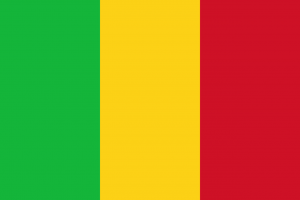Language/Bambara/Grammar/How-to-Use-Have
Hi Bambara learners! 😊
In this lesson, we will learn how to use the word "have" in Bambara grammar. This is an intermediate-level lesson, so make sure you are familiar with the basics of the language before proceeding. If you need any help, you can check out the Bambara grammar section on our website. And remember, the best way to learn a language is to practice with native speakers. You can find native speakers of Bambara on Polyglot Club and ask them any questions you may have. Let's get started!
What is "Have" in Bambara?[edit | edit source]
In Bambara, "have" is expressed using the verb "san" which also means "to have" or "to own." The verb "san" can be used in different tenses and moods to express the possession of an object, a quality, or a state of being.
For example:
- N ta san laptop ye. (I have a laptop.)
- A bè san jigi kelen. (He has black hair.)
- Mogo fè bolo, min san baga. (The monkey ate the banana, but I still have some left.)
Notice that the verb "san" is always followed by the object being possessed, which is introduced by the particle "ye."
"Have" in the Present Tense[edit | edit source]
To express "have" in the present tense, we use the following forms of the verb "san":
| Bambara | Pronunciation | English |
|---|---|---|
| Mɔgɔ san ye | MOH-goh sahn yeh | I have |
| Waati san ye | WAH-tee sahn yeh | You have |
| A san ye | ah sahn yeh | He/She/It has |
| Aw san ye | ow sahn yeh | We have (inclusive) |
| Amin san ye | ah-MEEN sahn yeh | We have (exclusive) |
| I ni san ye | ee nee sahn yeh | You (plural) have |
| Wòrɔ san ye | woh-RO sahn yeh | They have |
For example:
- Mɔgɔ san ye biiru. (I have a book.)
- Waati san ye ka kuma jènè. (You have a lot of money.)
- A san ye ka taa kɛnɛ. (He has a big house.)
"Have" in the Past Tense[edit | edit source]
To express "have" in the past tense, we use the following forms of the verb "san":
| Bambara | Pronunciation | English |
|---|---|---|
| Mɔgɔ sàrà | MOH-goh sah-RAH | I had |
| Waati sàrà | WAH-tee sah-RAH | You had |
| A sàrà | ah sah-RAH | He/She/It had |
| Aw sàrà | ow sah-RAH | We had (inclusive) |
| Amin sàrà | ah-MEEN sah-RAH | We had (exclusive) |
| I ni sàrà | ee nee sah-RAH | You (plural) had |
| Wòrɔ sàrà | woh-RO sah-RAH | They had |
For example:
- Mɔgɔ sàrà bolo kolo. (I had some bananas yesterday.)
- Waati sàrà taa duguw ka fɔ. (You had a big garden before.)
- A sàrà mɔgɔ ye dòn. (He had my phone number.)
"Have" in the Future Tense[edit | edit source]
To express "have" in the future tense, we use the following forms of the verb "san":
| Bambara | Pronunciation | English |
|---|---|---|
| Mɔgɔ dòn sàn | MOH-goh dohn sahn | I will have |
| Waati dòn sàn | WAH-tee dohn sahn | You will have |
| A dòn sàn | ah dohn sahn | He/She/It will have |
| Aw dòn sàn | ow dohn sahn | We will have (inclusive) |
| Amin dòn sàn | ah-MEEN dohn sahn | We will have (exclusive) |
| I ni dòn sàn | ee nee dohn sahn | You (plural) will have |
| Wòrɔ dòn sàn | woh-RO dohn sahn | They will have |
For example:
- Mɔgɔ dòn sàn kura. (I will have money tomorrow.)
- Waati dòn sàn biro ye kulu. (You will have a lot of books to read.)
- A dòn sàn taa kelen lamban. (He will have black shoes.)
Dialogue[edit | edit source]
- Person 1: Mɔgɔ san ye duguw ka fɔ. (I have a garden.)
- Person 2: Aw san ye duguw ka fɔ kɛ. (We also have a garden.)
- Person 1: Aw sàrà duguw ka fɔ gɔw. (We had a garden last year.)
- Person 2: I ni sàrà mɔgɔ ka fò. (You guys had a dog.)
- Person 1: A dòn sàn biiru bè. (He will have a new book.)
- Person 2: Mɔgɔ dòn sàn jɔkɔ ye kolo. (I will have some bananas tomorrow.)
Conclusion[edit | edit source]
Congratulations! You now know how to use the word "have" in Bambara. Remember to practice what you have learned with native speakers on Polyglot Club. If you have any questions, please ask them in the comments section below. Feel free to edit this wiki page if you think it can be improved. 😎
➡ If you have any questions, please ask them in the comments section below.
➡ Feel free to edit this wiki page if you think it can be improved. 😎
Upon wrapping up this lesson, take a look at these related pages: Give your Opinion & Conditional Mood.
Videos[edit | edit source]
How to count from 1-10 in Bambara/Dioula - YouTube[edit | edit source]
Other Lessons[edit | edit source]
Sources[edit | edit source]

